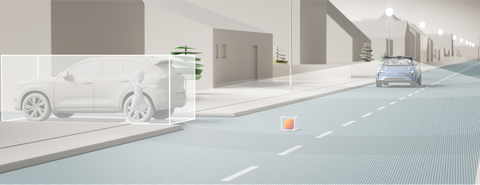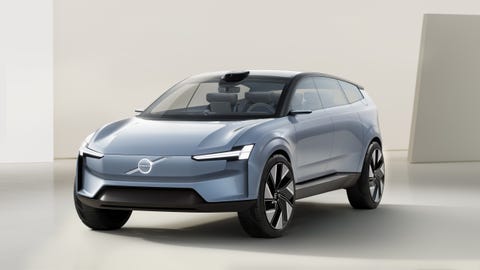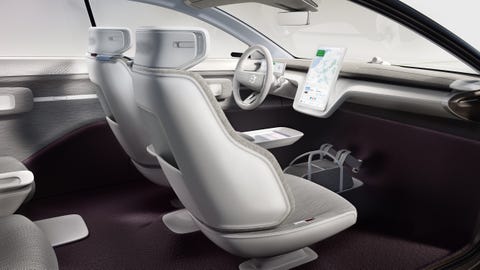- Volvo is gearing up for its next generation of electric vehicles with a few interesting debuts: a new electric SUV coming soon, a new highway-only self-driving technology called Ride Pilot that the new vehicle will get, and a new subscription service so drivers can actually use Ride Pilot.
- Volvo is testing its autonomous tech on roads in Sweden and plans to start testing Ride Pilot in California later this year. California is also where the automaker plans to launch Ride Pilot for its customers.
- Volvo will be asking owners to pay to use Ride Pilot (costs were not announced).
Volvo will debut more than a new model when it reveals an electric SUV later this year. The new flagship will introduce three key items, starting with the vehicle itself. The other two are a new, unsupervised autonomous driving feature called Ride Pilot and a subscription service that enables the use of the self-driving technology. Also of note is that when it launches, Ride Pilot will first be available in California before being “gradually” rolled out to other markets and regions. (Pictured is the automaker’s Concept Recharge, revealed in June 2021.)
There are a number of steps Volvo needs to take to make Ride Pilot available to drivers, though. First, obviously, the company needs to reveal the new electric SUV, which is planned for later this year. Second, Volvo needs to verify that the autonomous driving technology that makes up Ride Pilot works as promised on highways in the U.S. Volvo is already testing Ride Pilot in Sweden, together with its partner Zenseact, and gathering data in other parts of Europe and the U.S.
Volvo plans to start testing Ride Pilot in California by the middle of this year because that’s where, it says, “the climate, traffic conditions and regulatory framework provide a favorable environment for the introduction of autonomous driving.”
Third, and perhaps most controversially, Volvo has to convince people who buy the new SUV to pony up a subscription fee for Ride Pilot to work. Volvo did not provide any insight into how much it will charge for a subscription to Ride Pilot. There’s a hint of how Volvo plans to make its sales pitch in the company announcement this week: “Ride Pilot aims to free up more time for customers and make driving a Volvo even more convenient and enjoyable.” In other words, expect to see arguments that ask you to consider spending money to take advantage of the time you’d otherwise waste driving your car. Mentioning all of the time drivers lose behind the wheel is not a message automakers have been eager to promote in the past, but if the industry is changing to an electric, autonomous future, some of the ad messages are likely to change as well.
Here’s another line from Volvo’s announcement: “By using Ride Pilot, drivers will be able to free up time while driving, and spend it on secondary activities like reading, writing, working or socializing. The feature can also help drivers arrive at their destination rested and recharged, by reducing the mental strain that may come with driving, especially in traffic jams or heavy traffic.” The sensor suite Volvo will use in the upcoming electric SUV and other next-generation vehicles is made up of over two dozen sensors, including lidar from another partner in the project, Luminar, as well as five radars, eight cameras, and 16 ultrasonic sensors. Over-the-air updates will also be used to keep Ride Pilot’s software current.
From the preliminary information Volvo is releasing, Ride Pilot sounds like an enhanced version of self-driving technologies such as GM’s Super Cruise. The car is able to drive itself in limited situations without input from the driver and will be limited to use on highways, at least at the beginning. Volvo said the software and sensors used to enable Ride Pilot will be standard and that the car will be able to benefit from safety features that use the sensor suite, but Ride Pilot’s actual self-driving capability “will only be made available to customers once it has gone through Volvo Cars’ rigorous verification and testing protocol. This includes validation of the technology as safe for use on highways in a number of varying conditions.” And, of course, once you pay your subscription fee.
The new electric SUV will also come with a new type of name for a Volvo model. Volvo Cars’ CEO Håkan Samuelsson told Automotive News Europe in July 2021 that the new EV will use a name that one would give to a child, not an alphanumeric designation like XC60 or XC90, and he later added that the name will start with a vowel.
This content is imported from {embed-name}. You may be able to find the same content in another format, or you may be able to find more information, at their web site.
This content is created and maintained by a third party, and imported onto this page to help users provide their email addresses. You may be able to find more information about this and similar content at piano.io




